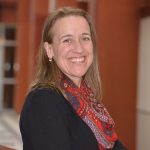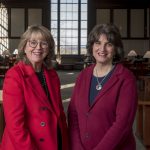U.S. News & World Report has issued its 2020 rankings of the best graduate schools of education in the nation, with the Neag School of Education ranking among the top 20 public graduate schools of education in the United States for the fourth consecutive year.
The ability to collaborate and advocate beyond the classroom and across stakeholders, from department chairs to administrators to parents, is a crucial teacher leadership skill, says Michele Back, assistant professor of world languages education at Neag School of Education. The critical shortage of world language teachers, she says, combined with the diminishing number of U.S. students taking world language courses, means that teacher candidates in this content area must be strong advocates for their own profession from the moment they step into the classroom.
“We’re trying to make it so people with disabilities have more opportunities for employment in society, right?” said Allison Lombardi, a professor who teaches in the Special Education Program at the University of Connecticut. “There’s not a separate society for just people with disabilities, so it really doesn’t make sense for us to create programs that are so separate.”
Claire Smith, an African-American female, grew up in a time when both of her underrepresented identities first made their breakthroughs. She told of how both her parents grew up as big Jackie Robinson fans and how that had a trickle-down effect on her. In a time where blacks in America faced oppression in a multitude of areas in society, every breakthrough was of major significance.
“This is a matter of priorities,” says Preston Green. “States should first provide sufficient funding to traditional public schools in urban areas. Once states have systems of traditional public schools that meet the educational needs of these students, then they can assess how much funding and resources to devote to charter schools.”
Congratulations to our Neag School alumni, faculty, staff, and students on their continued accomplishments inside and outside the classroom.
The University of Connecticut recently unveiled Courtroom 600, a project that places users inside the courtroom at the Nuremberg trials where Nazis and collaborators were tried. This project, still in prototype form, allows users to engage with virtual reality technology in order to interact with a fictitious member of the United States team of prosecutors. It also enables users to read primary source documents, gather evidence and prosecute select defendants.
As part of an international partnership that began two-plus years ago, Neag School Dean Gladis Kersaint and Yuhang Rong, UConn’s associate vice president for global affairs, traveled this past fall to the Middle East on behalf of the University to connect with educators, administrators, students, and even royalty, in a country where one Neag School program has been making an impact.
The University of Connecticut has accepted an invitation to become part of the BOLD Women’s Leadership Network. The BOLD program seeks to equip young women at select universities nationwide to be innovative agents of change, both during their college careers and after they complete their studies.
The field of education has been going through constant evaluation and evolution since 1983, when “A Nation At Risk” was published.
“That report sounded the alarm that the United States was not at the top of the food chain anymore when it comes to education,” says Richard Gonzales, director of UConn’s Neag School of Education leadership preparation program.
Since then, responses to the report have encompassed curriculum changes and standards, teacher preparation, and in the early 2000s, a growing emphasis on leadership – in particular the role and training of school principals.






